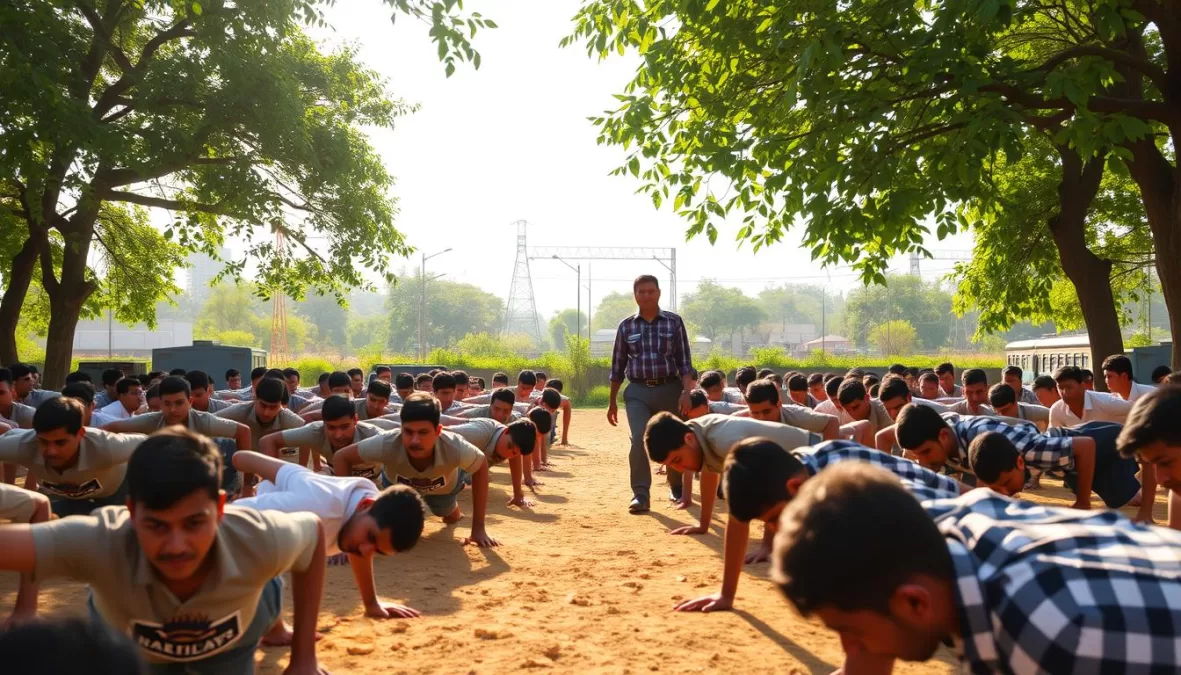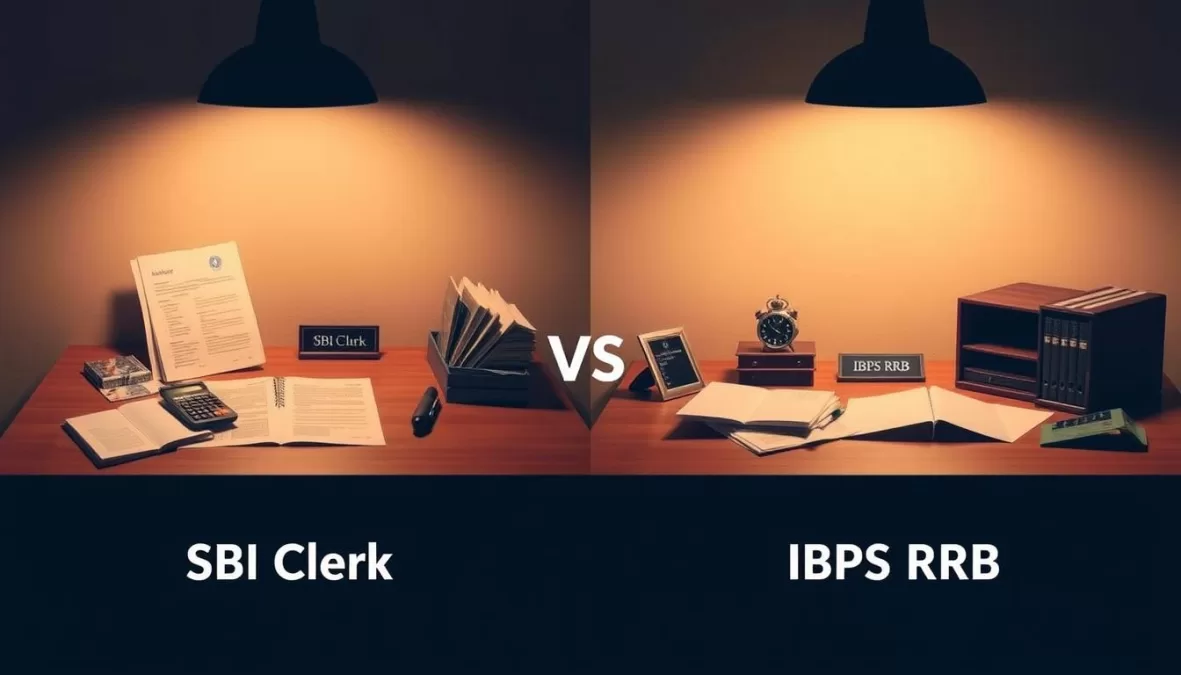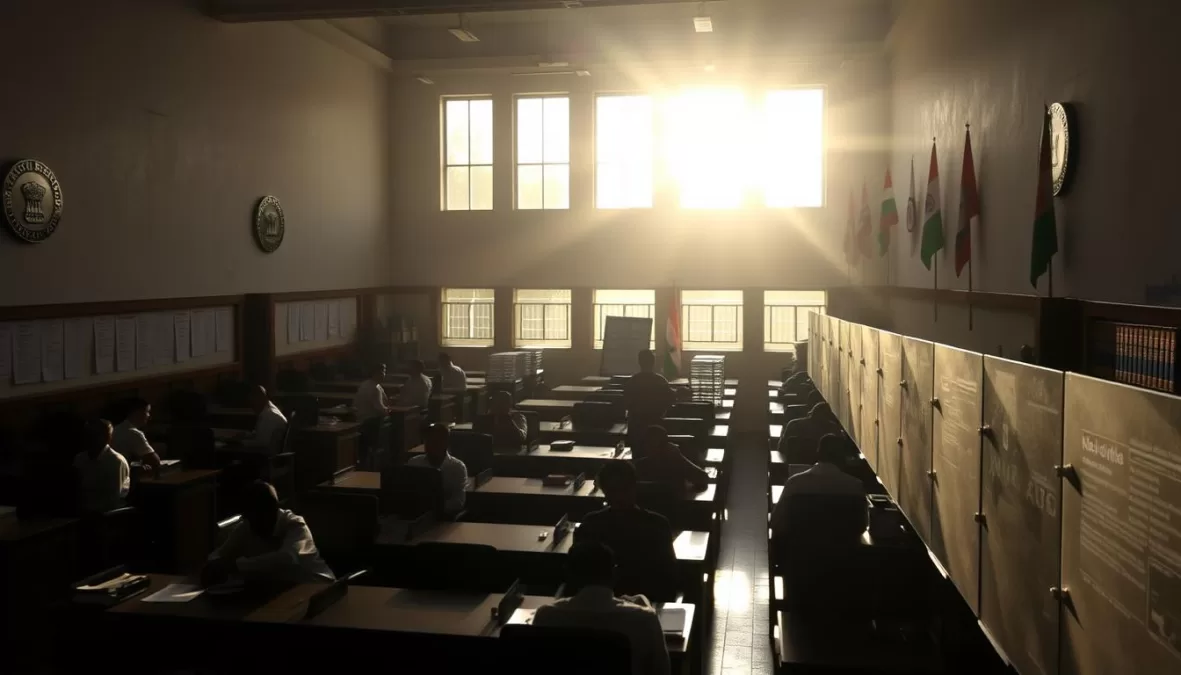Stable careers in the public sector continue to attract millions, especially with over 65% of the population under 35. The right opportunity can provide financial security and growth without years of intense preparation.
This guide highlights 10 roles with manageable syllabi and solid salary ranges, from ₹18,000 to ₹69,100 monthly. Whether you hold a 10th-grade certificate or a degree, there’s a path tailored for your qualifications.
Why focus on these roles? They demand basic knowledge, offer structured study materials, and often include mock tests for effective preparation. Let’s explore how you can align your skills with these attainable positions.
Key Takeaways
- Public sector roles provide stability with salaries up to ₹69,100/month.
- Many positions require only a 10th or 12th-grade education.
- Exams like SSC CHSL and RRB Group D have straightforward syllabi.
- State-specific exams, such as Rajasthan Patwari, simplify regional opportunities.
- Preparation resources, including mock tests, are widely accessible.
Why Choose Easy Government Exams in India?
A shorter syllabus and clear eligibility make certain positions more accessible. These roles balance job security with realistic preparation timelines, ideal for those starting their careers.
Lower Competition for Faster Success
Fewer applicants mean better odds. For example, SSC MTS has an 18% clearance rate, while UPSC hovers at 0.2%. Focused effort yields quicker results.
Simpler Eligibility Criteria
Most roles require a 10th or 12th-grade certificate. No advanced degrees or complex prerequisites. This opens doors for a wider talent pool.
Manageable Syllabus and Shorter Prep Time
Compare 3–6 months of study to 1+ years for tougher tests. Over 90% of syllabi include Reasoning and General Awareness, reducing the learning curve.
| Exam | Subjects | Study Duration |
|---|---|---|
| SSC MTS | 4 | 4–6 months |
| UPSC | 25+ | 12–18 months |
Pro tip: Mock tests and previous papers streamline preparation. They highlight recurring topics and boost confidence.
Easy Government Exams India: Top Picks for 2025
With over 1.03 lakh railway jobs announced for 2025, now is the best time to explore public sector roles. Banking and state-level opportunities also show significant growth, making them ideal for quick career entry.
Growth Sectors to Watch
Railways lead with a 41% surge in vacancies, while banking follows at 23%. State exams like Rajasthan Patwari simplify regional hiring with localized syllabi.
| Exam | Vacancies (2025) | Subjects | Prep Time |
|---|---|---|---|
| RRB Group D | 1.03 lakh | Maths, GK, Reasoning | 3–5 months |
| IBPS Clerk | 58,000+ | English, Aptitude | 4–6 months |
| Rajasthan Patwari | 12,000 | State GK, Maths | 2–4 months |
Pro tip: Mock tests for these exams are widely available, helping you gauge readiness efficiently.
State-level roles often have fewer applicants, boosting your chances. Focus on sectors aligning with your strengths for faster success.
SSC CHSL: Your Gateway to Central Government Jobs
Landing a stable career in central ministries starts with the right entry point. The SSC CHSL exam unlocks roles like Lower Division Clerk, Postal Assistant, and Data Entry Operator across key departments. With a 12th-grade qualification, you can apply for these posts and secure a monthly salary starting at ₹19,900.
Exam Dates and Eligibility
Mark your calendar: Tier I tests run from July–August 2025. Applications open 25th May–25th June 2025. To qualify:
- Age: 18–27 years (relaxations apply for reserved categories).
- Education: 12th pass or equivalent.
- Nationality: Indian, Nepalese, or Bhutanese citizens.
Syllabus Breakdown and Scoring Tips
Tier I covers four subjects:
| Subject | Key Topics | Weightage |
|---|---|---|
| English Language | Grammar, Vocabulary | 25% |
| Quantitative Aptitude | Basic Arithmetic, Algebra | 25% |
| General Awareness | Current Affairs, History | 25% |
| General Intelligence | Logical Reasoning | 25% |
Pro tip: Solve 5+ mock tests weekly to identify weak areas. Focus on speed for Tier II’s pen-paper format.
Salary and Career Growth
Selected candidates enjoy:
- Starting pay: ₹19,900–₹63,200 (Pay Level-2) with 3% annual hikes.
- Allowances: DA, HRA, and travel reimbursements.
- Promotions: Move to Upper Division Clerk in 4–6 years.
“Clearing SSC CHSL can fast-track your journey to higher-paying roles like SSC CGL.”
Vertical mobility to ministries like Finance or Defence is possible with additional exams. This makes it a strategic launchpad for long-term growth.
IBPS Clerk: Secure a Banking Career with Minimal Effort
Breaking into the banking sector doesn’t require years of intense study—IBPS Clerk offers a straightforward path. This role combines stability with a manageable syllabus, ideal for those starting their careers. With salaries up to ₹32,000/month and 58,000+ vacancies in 2025, it’s a smart choice.
Key Dates and Application Process
Mark your calendar: Prelims run August–September 2025, with Mains in October. Applications open 1st–21st July 2025 on ibps.in. Follow these steps:
- Register with basic details (name, mobile, email).
- Upload scanned documents (photo, signature, 10th–12th marksheets).
- Pay the ₹850 fee (₹175 for SC/ST/PWD).
Focus Areas for High Scores
35/100 Prelims questions cover General Awareness. Prioritize these topics:
- RBI policies: Monetary reports, repo rate changes, and digital banking updates.
- Quantitative Aptitude: Focus on data interpretation (15/35 questions).
- Mock tests: Use platforms like Testbook or Oliveboard for timed practice.
“Speed matters—aim for 25 words/minute in the typing test to clear the final round.”
Negative marking deducts 0.25 points per wrong answer. Balance speed with accuracy to maximize scores.
Rajasthan Patwari Exam: A State-Level Opportunity
State-level roles offer unique advantages, especially when you understand regional requirements. The Rajasthan Patwari exam is tailored for locals, with 40% of questions focused on the state’s geography, history, and policies. This makes preparation more intuitive if you’re familiar with the area.
Localized Syllabus and Preparation Hacks
Focus on Rajasthan-specific GK to dominate the exam. Key topics include Land Reform Acts, Tehsil maps, and the state’s independence movement. These appear frequently in the General Awareness section.
Vernacular resources help too. Study materials in Hindi and Devanagari script are widely available. They cover:
- Local land record management terms.
- Revenue department workflows (tax collection, surveys).
- Rajasthan’s famous tourist sites and cultural heritage.
| Subject | Key Topics | Weightage |
|---|---|---|
| Rajasthan GK | Land laws, Tehsil maps | 40% |
| Numerical Skills | Basic arithmetic | 20% |
| Language | Hindi grammar, synonyms | 20% |
“Mastering local land records can set you apart—90% of Patwari duties involve rural tax and survey management.”
Pro tip: Practice with Rajasthan-specific mock tests. They highlight recurring themes and boost confidence for the actual exam.
RRB Group D: Entry-Level Railway Jobs Made Simple
Physical fitness plays a crucial role in securing RRB Group D jobs. These roles prioritize practical skills, making them accessible if you meet basic benchmarks. With over 1.03 lakh vacancies in 2025, it’s a prime opportunity to join the Indian railways.

Physical Efficiency Test Demystified
The PET evaluates endurance and strength. Male candidates must cycle 35km in 80 minutes or lift 35kg for 100 meters. Women carry 25kg under the same conditions.
Training regimen:
- Practice cycling 3–4 times weekly to build stamina.
- Include weight training (squats, deadlifts) for lifting tests.
- Time yourself to match the 2-minute benchmark.
Medical Standards for Different Posts
Roles are categorized by fitness level (A-2 to C-2). Key requirements:
- Vision: 6/6 acuity without glasses for certain posts.
- Hearing: No defects in whisper tests.
- Color vision: Must distinguish signals correctly.
“Clearing the PET and medical checks ensures you’re fit for fieldwork—90% of Group D roles involve manual tasks.”
Safety Equipment Provided During Training
New hires receive gear like helmets, gloves, and reflective vests. Training covers:
- Proper lifting techniques to prevent injuries.
- Emergency protocols for track maintenance.
- Tool handling for electrical/mechanical roles.
Pro tip: Focus on cardio and strength training early. Mock PETs help gauge readiness before the actual test.
Delhi Police Constable: High Pay with Basic Preparation
Joining the Delhi Police as a Constable offers both stability and growth without lengthy preparation. With a starting salary of ₹21,700 and free uniform allowances, this role balances financial security with community service.
New staff undergo a 12-month beat management program. It covers crime prevention, public interaction, and emergency response. Field training ensures hands-on experience from day one.
Career progression is structured. After 5–8 years, you can promote to Sub-Inspector (SI) through departmental exams. Leadership roles in units like Traffic or Security become accessible with experience.
- Specialized departments: Join PCR for emergency response or Traffic for urban management.
- Benefits: Housing subsidies, medical coverage, and pension plans.
“Delhi Police Constables form the backbone of city safety—90% of frontline duties rely on their training.”
Pro tip: Focus on physical endurance tests during preparation. Running and obstacle drills are key to clearing the final selection.
India Post GDS: Rural Job Opportunities with 10th Pass
A 10th-grade education opens doors to meaningful work in your own village or town. The India Post Gramin Dak Sevak (GDS) program connects rural areas with essential postal services while offering stable income. With 65% of seats reserved for locals, your roots in the community become an advantage.
How Merit-Based Selection Works
Your 10th-class marks determine eligibility—no separate government exam is required. Higher scores improve ranking for village-wise vacancies. The staff selection commission prioritizes candidates who understand regional needs, ensuring efficient mail delivery.
Key benefits for selected candidates:
- Bicycle allowance: ₹5,000/year for mail delivery in remote areas.
- Digital literacy training: Free courses on handling e-postal services.
- Flexible hours: Part-time roles allow you to manage personal commitments.
“GDS roles bridge gaps in rural connectivity—90% of deliveries reach homes without internet access.”
Pro tip: Check the official India Post portal for vacancy updates. Local language proficiency boosts your chances during selection.
SBI Clerk vs. IBPS RRB: Which Banking Exam Is Easier?
Choosing between SBI Clerk and IBPS RRB depends on your career goals and preferences. Both exams offer stable roles in the banking sector, but their structures differ significantly. Understanding these differences helps you pick the right path.

Comparative Difficulty and Syllabus
The IBPS RRB Clerk exam is often considered simpler than SBI Clerk. Both cover Reasoning, English, General Awareness, and Quantitative Aptitude. However, SBI Clerk includes more complex questions, especially in the English section.
| Exam | Difficulty Level | Key Focus Areas |
|---|---|---|
| SBI Clerk | Moderate to High | Advanced Grammar, Data Interpretation |
| IBPS RRB Clerk | Basic to Moderate | Regional Banking Terms, Simpler Math Problems |
Pro tip: If you prefer straightforward questions, IBPS RRB might suit you better. SBI Clerk demands deeper subject knowledge.
Salary and Posting Flexibility
SBI Clerk offers a higher starting salary—₹2,900 more than IBPS RRB. However, IBPS RRB provides rural allowances, while SBI Clerk focuses on urban postings.
- Rural allowances: IBPS RRB staff get extra pay for remote locations.
- Transfer policies: SBI Clerk roles may involve frequent relocations.
- Promotions: SBI Clerk has faster career growth, with managerial roles in 5–7 years.
“IBPS RRB suits those seeking stability in one location, while SBI Clerk fits ambitious candidates ready for mobility.”
Consider your long-term plans before deciding. Both exams open doors in the banking sector, but their benefits cater to different lifestyles.
How to Pick the Right Government Exam for You
Finding the perfect role starts with understanding your skills and goals. Some tests focus on regional knowledge, while others prioritize speed or subject mastery. The right match boosts your chances of success.
Matching Qualifications to Exam Requirements
Check the basic criteria before diving into preparation. Banking roles often need 12th-grade English skills, while railway jobs may require physical fitness. Here’s a quick guide:
- Education level: SSC CHSL needs 12th pass; RRB Group D accepts 10th pass.
- Age limits: Most roles cap at 27–32 years (relaxations apply).
- Language skills: 70% of banking tests assess English comprehension.
State exams like Rajasthan Patwari favor locals familiar with regional policies. Always verify official notifications for updates.
Aligning Strengths with Exam Patterns
Your natural abilities can guide your choice. If numbers come easily, focus on quantitative-heavy exams like IBPS Clerk. Strong readers might prefer descriptive tests.
| Strength | Ideal Exam | Key Section |
|---|---|---|
| Logical reasoning | SSC CHSL | General Intelligence (25%) |
| Current affairs | IBPS RRB | General Awareness (40%) |
“Play to your strengths—target exams where 50%+ content aligns with your skills for faster preparation.”
Pro tip: Take a question-based diagnostic test first. It reveals which exam patterns suit you best.
Consider disability-friendly options too. Many tests provide scribes or extra time for eligible candidates. Check official guidelines for accommodations.
Proven Strategies to Crack Easy Government Exams
92% of successful candidates credit mock tests for their high ranks—here’s how to replicate their approach. Whether you’re prepping for SSC CHSL or IBPS Clerk, these tactics streamline your path to success.
Time Management and Study Plans
Divide your day into focused 90-minute blocks. For example:
- Morning: Tackle tough topics like Quantitative Aptitude.
- Afternoon: Review General Awareness with flashcards.
- Evening: Solve one full-length mock test.
Use analysis sheets to track weak areas. Apps like Trello help organize daily goals.
Best Books and Online Resources
Combine standard guides with digital tools for comprehensive coverage:
| Subject | Book | Online Resource |
|---|---|---|
| Math | R.S. Agarwal | Testbook YouTube |
| English | Arihant Publications | Oliveboard Blogs |
“Toppers cross-reference 3+ sources—don’t rely on just one book.”
Mock Tests and Previous Papers
Prioritize quality over quantity. After each test:
- Note recurring question patterns.
- Time spent per section (aim for ≤0.8 minutes/question).
- Compare answers with official keys.
Pro tip: Simulate exam conditions—no breaks, no distractions.
Conclusion
Choosing the right path in the public sector depends on your skills and goals. Match your qualifications with roles that offer growth and stability. Early applications give you more time to prepare.
Consistent effort pays off. Focus on mock tests and targeted study plans to boost your confidence. The right strategy turns challenges into opportunities.
Ready to take the next step? Assess your strengths, pick an exam that fits, and start preparing today. Your future in the public sector begins now.





